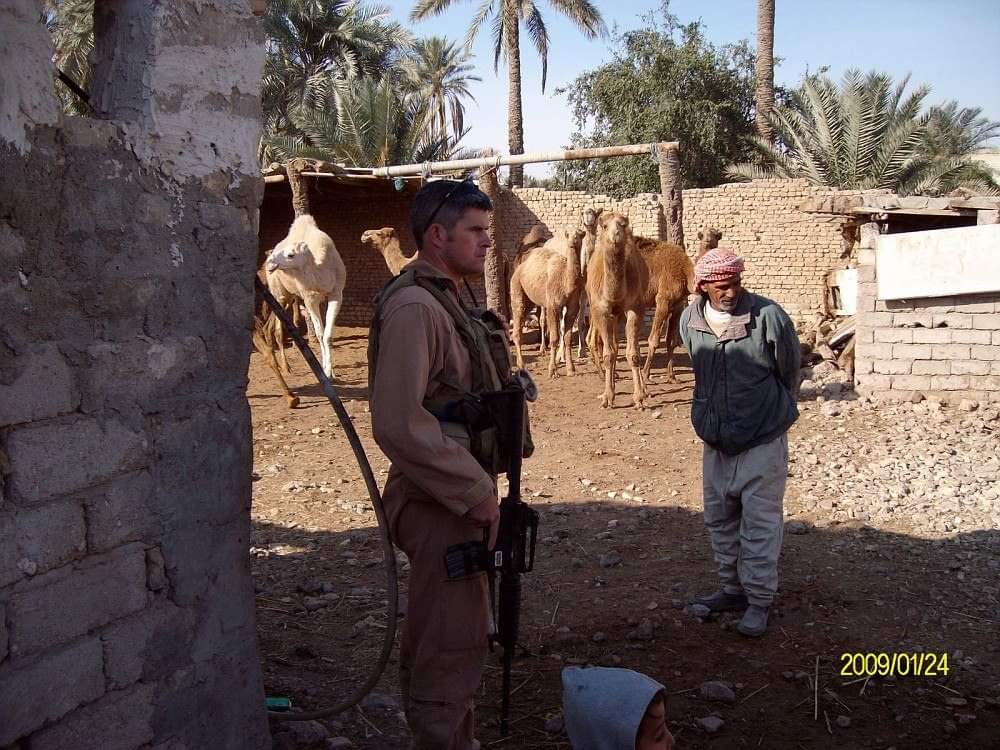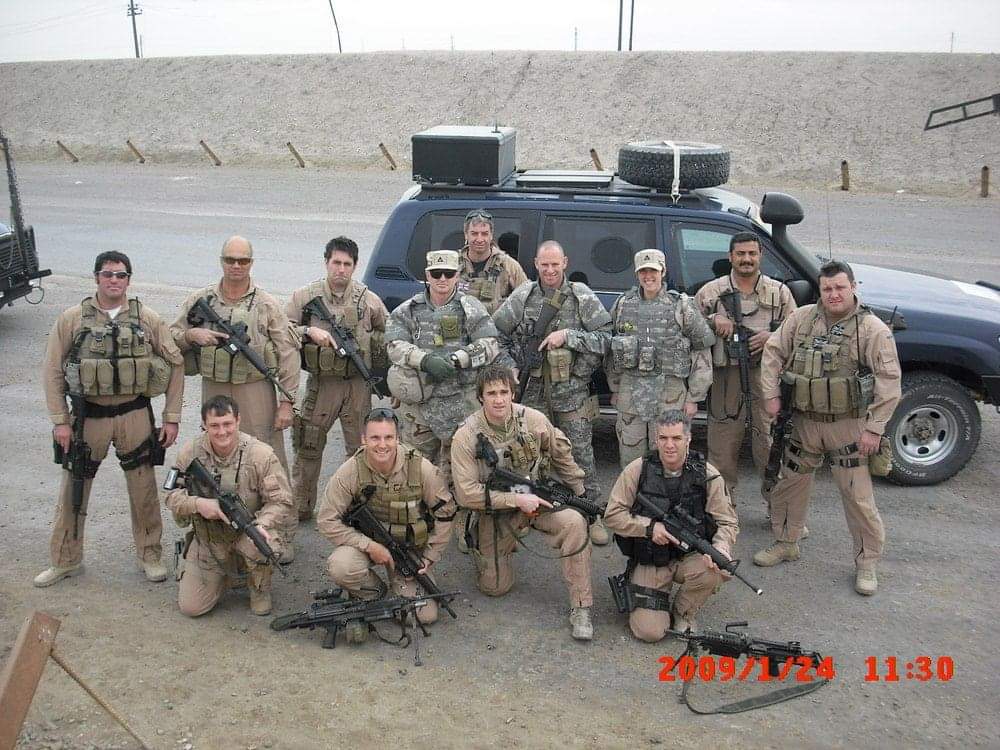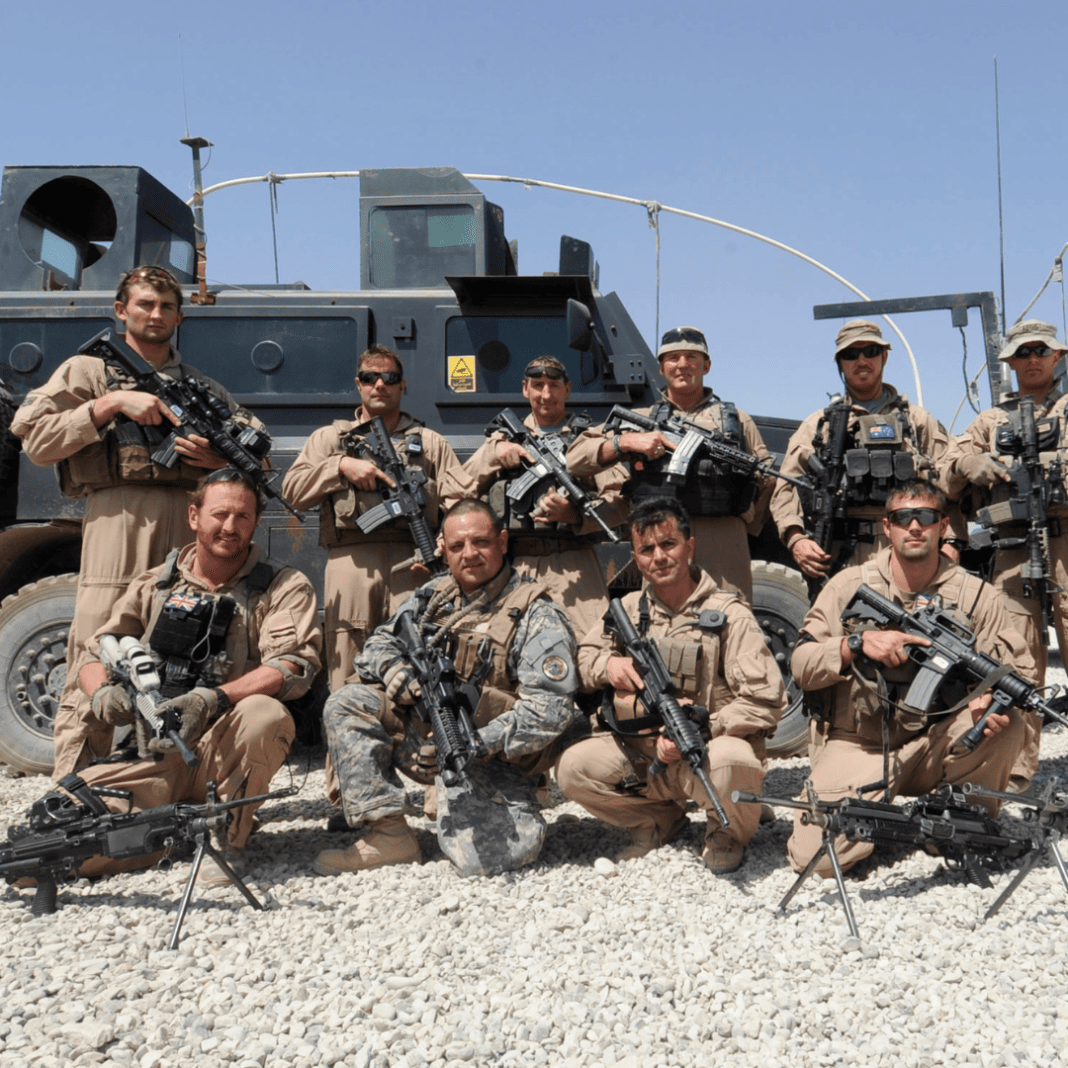1.0. Introduction
Aegis Defence Services was a private military company (PMC) which specialised in the provision of security services to governments and major oil companies including those in Iraq and Afghanistan (source). Aegis Defence Services made most of their business through contracts with the US government during their time in Iraq but have also operated under a UN contract in Somalia and with multinational companies who operate in “high-risk environments” (source). For example, they have worked for companies in Angola, Niger, Nigeria, the Democratic Republic of the Congo (DRC) and Central African Republic (CAR).
2.0. History and Symbols of Aegis Defence Services
2.1. History of Aegis
Lt Col Tim Spicer, and three partners, founded Aegis Defence Services in 2002. Spicer’s partners in the business were Mark Bullogh, Jeffrey Day, and Dominic Armstrong (source). Spicer had previously been CEO of another PMC ‘Sandline’, and therefore had the experience and knowledge to develop the company. Jeffrey Day was an entrepreneur, whilst Bullough and Armstrong are former investment bankers. It is therefore fair to suggest that Spicer was the ‘military guy’ behind the operation, whilst his partners brought their own business expertise. Their strategic vision was to develop an organisation that encapsulated the entire risk management process including identifying risks, analysing the effects of said risk and mitigating the outcome.

2.2. Symbols of Aegis
Interestingly, an Aegis is a “shield or breastplate emblematic of majesty that was associated with Zeus and Athena” (source). The company like chose its name because of this connection and they synonyms it has with protection.
3.0. Organisation of Aegis Defence Services
3.1. Place Within Broader Government
Although there are no direct links between Aegis Defence Services and the UK government, the fact that many employees are former military servicemen creates a network. However, the UK government has only ever hired PMCs in exceptional cases, and there is no evidence of the government hiring Aegis (source).
The British government distanced themselves from Aegis Defence Services after discovering controversies regarding founder Tim Spicer’s time serving in Northern Ireland (source). This case is discussed later on in this article. However, as a result, there is little direct linkage between the UK government and Aegis Defence Services.
3.2. Financing
Working as a security contractor at the height of the Iraqi coalition was a lucrative mission and provided Aegis with a great deal of financing. Significantly, at one point around 60 British companies were operating in Iraq. Former Director General of the British Association of Private Security Companies, Andy Bearpark, said:
“In Iraq in 2003 and 2004 money was basically free. That meant contracts were being let for ridiculous amounts of money – millions and millions of dollars of contracts being pumped into the industry”
Aegis are primarily financed through obtaining contracts with external governments and multinational companies. Importantly, their major paychecks have come from the US government who awarded Aegis two separate contracts in 2004 and in 2008. These contracts were worth $293 million and $475 million respectively (source). Furthermore, according to reports, the 2008 contract was the largest single security contract in Iraq (source). A report by the Special Inspector General for Iraq Reconstruction (SIGIR) noted that by 2011, Aegis’s income from the US government had passed $1 billion (source).
3.3. Business Structure
Aegis Defence Services operated as a Private Limited Company (Ltd.) (source). Correspondingly, the company operated under the management of a chairman, a Chief Executive Officer (CEO) and a board of directors (source).
3.4. Key Figures
Tim Spicer
Spicer is the founder of Aegis and was a former Scots Guard in the British military. However, Tim Spicer has faced a great deal of controversy in his lifetime. He had previously founded the company ‘Sandline’ which was at the centre of the 1998 ‘Arms to Africa’ scandal (source). A report found that his company breached UN sanctions by sending 30 tonnes of weapons to Sierra Leone during the civil war.
Furthermore, Spicer was also involved in an international scandal in Papua New Guinea. Peter W. Singer, author of the book ‘Corporate Warriors’ said that:
“The company was hired to help put down a rebellion in Papua New Guinea, and the local army certainly wasn’t happy to find out that a company had been brought in, paid more than their overall budget. So [the army]…basically launched a coup” (source)
Spicer’s tumultuous past therefore raised criticism when Aegis Defence Services was offered contracts by the US government. Members of the American-Irish community also displayed discontent with Tim Spicer’s alleged involvement in the death of an 18-year old in Northern Ireland at the time when Spicer was Scots Guard in Belfast (source). Spicer did feature prominently in a lobbying campaign to allow the killers back into the regiment.
Sir Nicholas Soames
UK Conservative politician, Soames, was a chairman of Aegis and still acts as a member for the International Advisory Board for GardaWorld, who bought Aegis in 2015 (source). Soames served as an Member of Parliament (MP) for the constituency of Crawley and Mid Sussex and went on to become the Minister of State for the Armed Forces and consequently the Shadow Secretary of State for Defence (source). Nicholas Soames is also the grandson of Winston Churchill, former war-time Prime Minister of the United Kingdom. In the following interview with Channel 4 News, Soames discusses his late grandfather:
Graham Binns
Binns was CEO of Aegis between 2010 and 2015, before going on to become GardaWorld’s Senior Managing Director until 2018 (source). Prior to his career in the PMC, Graham Binns held high command in the British Army and had a long history in the military from 1975 until 2010. Binns spent his early regimental service in Germany, Norway, and Northern Ireland before he served in the Ministry of Defense from 1986 until 1988 (source). Subsequently, Binns served as Major General Commander in the UK’s Armoured Division in Germany and Iraq.
3.5. Recruitment
Methods
Aegis recruited many former British military veterans who were perhaps struggling to fit back into normal society. A former employee has claimed that they joined Aegis after leaving the military due to a feeling of lost purpose. Former-military personnel also brought a lot of skill to the field of private security. Former Aegis CEO Graham Binns stated that “in the world of business, ex-military people have got a lot to offer” (source).
Requirements
There did not seem to be many requirements to work for Aegis. A US audit report found that not all employees were qualified for weapons use and that the company did not properly screen many of its employees (source). Aegis claimed that police checks are difficult to obtain and largely irrelevant due to the dysfunctional nature of the Iraqi government.
Possible Foreign Recruitment
Aegis not only recruited former British military but also employed mercenaries from Sierra Leone during their operations in Iraq (source). Former Aegis Director James Ellery claims that the main reason for foreign recruitment was to cut costs:
“So you go from the Midlands of England to Nepalese, Asians etc. and then at some point you say I’m afraid all we can afford now is Africans”
Aegis paid workers from Sierra Leone as little as $16 a day.
Aegis faced a great deal of controversy after two former child soldiers from Sierra Leone threatened legal action against Aegis over psychological harm they suffered whilst working for the company. The men claimed that their experience in Iraq compounded their trauma from childhood and that Aegis had failed to monitor their mental health (source). Former Director James Ellery defended Aegis’s position. He stated that it would have been wrong to check if potential employees had been child soldiers as they would be penalising people for doing jobs they had been forced into.

3.6. Connections to other important organisations
Aegis Defence Services was a founding member of the British Association of Private Security Companies (BAPSC) (source). BAPSC was launched in February 2006 and aims to raise the standard of operations. Furthermore, BAPSC aims to ensure that all rules and principles of international humanitarian law are complied with (source). The organisation works closely with the UK government to maintain good relations between PMCs and the UK government. By starting this type of organisational body, Aegis was arguably able to ‘save face’ regarding their alleged human rights abuses in the past. However, the organisation has only published one policy paper on the regulation of the private security industry and thus lacks solid commitment.
Aegis was also a member of the Private Security Company Association of Iraq (PSCAI). PSCAI was a nonprofit organisation which was formed to address concerns related to the industry of private security (source). The organisation consisted of 40 members and liaised with the government of Iraq and the coalition governments. Significantly, PSCAI required members to comply with Rules on the Use of Force, another indication that Aegis was attempting to remain transparent. PSCAI was dissolved in December 2011 (source).
Furthermore, Aegis was one of the founding signatories to the International Code of Conduct for Private Security Service Providers (source). A remarkable 94 countries signed the code. The code aims to “limit the use of force, respect human rights of local nationals, vet and train personnel, and report any violations”. Once again, many argue that this was a measure taken by Aegis to help their reputation. Examples of negative publicity include actions in Iraq, which will be discussed further on in this article.
3.7. Involvement of other key organisations in Aegis
Aegis’s major competitor was US military contractor Dyncorp (source). When Aegis won the major contract with the US government, Dyncorp submitted a formal protest to the US Congress’s Government Accountability Office. The adversary cited founder Tim Spicer’s controversial past and claimed that Aegis would bring more trouble to the US’s operations.
Aegis Defence Services ran into trouble with organisation ‘Group Switzerland without and Army’ (GSoA) (source). The GSoA organised a street protest after a Swiss newspaper reported that Aegis had opened a holding base in Basel. The protest against Aegis resulted in widespread public discussions about PMCs in Switzerland, who aim to have a policy of military neutrality. As a result, the Swiss government enforced stricter controls over PMCs, like Aegis, in Switzerland.
4.0. Tactical-Operational Information of Aegis Defence Services
4.1. Operations
Aegis’s most prominent operation was in Iraq as part of their contract with the US.
In 2005, the public scrutinised Aegis’s operation in Iraq when a user published a video on the internet. The video showed a group of Aegis employees randomly shooting at civilian vehicles (source). In the video, it appeared that Aegis soldiers were shooting out of the back of their vehicle on the road to Baghdad airport. A disgruntled employee allegedly posted the video. The US army’s criminal investigation division cleared Aegis of any wrongdoing in June 2006. Aegis had succesfully argued that the former employee had manipulated the footage (source).

Basra, Iraq
Aegis also played a major role in the conflict in Basra, Iraq. The governor of Basra hired the PMC to replace the British troops who had left (source). Aegis strongly participated in the Attack on Basra in 2003.
UNSOS
In 2014, Aegis won a contract with the UN worth $20 million (source). The contract involved the provision of strategic communications for the UN Support Office in Somalia (UNSOS).
4.2. Core Purposes
Under their contract with the US government, Aegis’ core purposes in Iraq were:
- Provide security in Iraq for contractors and US staff
- Anti-terrorism support
- Escort security and provide close personal protection
- Protection for units of the US Army Corps of Engineers who were carrying out reconstruction projects
- Co-ordinate road movement
- Training and Equipping Iraqi security forces
- Intelligence Services
In addition, Aegis assisted with the collection of ballot papers in Iraq’s referendum in 2005 (source).
4.3. Personnel Size
At the height of their contract in Iraq, Aegis had approximately 1400 personnel working for the company. Most personnel were Iraqis whilst the majority of the rest were former British military servicemen (source).
Aegis’ personnel have faced danger themselves, as one would expect in a conflict zone like Iraq. Between 2005 and 2008, reports estimate that opposition forces attacked Aegis men 168 times and killed 8 employees (source). However, a WikiLeaks source claims that in 2006, more than 30 workers had been killed.
5.0. The Future for Aegis Defence Services
In 2015, GardaWorld, a Canadian security company, acquired Aegis Defence Services (source). Due to their influence in Iraq, GardaWorld kept the Aegis title for their branch in Southern Iraq where they continue to protect oil fields.
6.0. Conclusion
Aegis Defense Services were a major British private military company who won major contracts with the US government during their time operating in Iraq. Although their founder, Tim Spicer, has a wealth of knowledge and experience in the field, he was a character shrouded in controversy which negatively impacted the image of the company. Regardless, they still managed to redeem prestige and founded the International Code of Conduct for Private Security Service Providers and were a founding member of the British Association of Private Security Companies (BAPSC). The company played major roles in protecting US personnel in Iraq; replacing British troops in Basra; and were responsible for the provision of strategic communications for the UN Support Office in Somalia. In 2015, the company were acquired by security service company ‘GardaWorld’ and are still responsible for protecting oil fields in Iraq.

